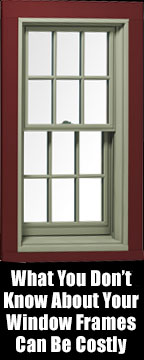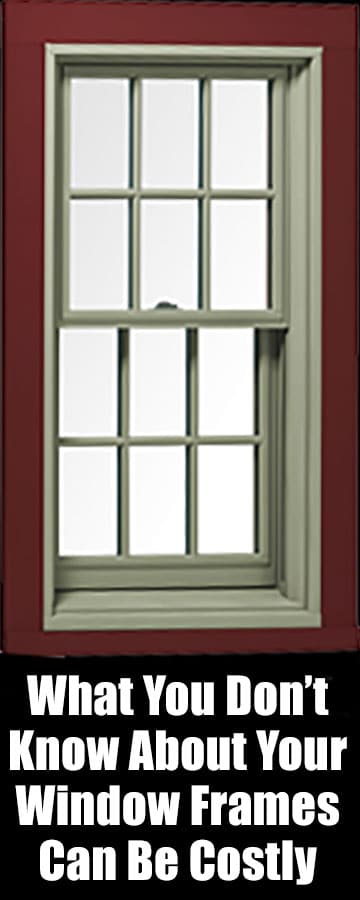

 Winter is upon us in New Jersey. If your heater is already working overtime to keep the indoor temperature comfy, it might be time to start talking about replacement windows to keep out the drafts and make your home more cozy and lower your heating bills.
Winter is upon us in New Jersey. If your heater is already working overtime to keep the indoor temperature comfy, it might be time to start talking about replacement windows to keep out the drafts and make your home more cozy and lower your heating bills.
Still doing your research? Here’s a rundown on the different frames and glazing options available on the market in New Jersey – and some information about how pairing energy-efficient frames with the proper glazing works to your advantage.
Fiberglass frames have better thermal performance than non-insulated vinyl or natural wood frames. Fiberglass is stronger than vinyl and the internal air cavities created during the manufacturing process increase insulation properties. Fiberglass is also a stable material that doesn’t droop or bend like poor quality vinyl.
Metal frames (aluminum; steel is rarely used residentially, these days) are lightweight and often require less maintenance than wood since they aren’t subject to rot and mildew. However, metal lacks superior insulating qualities when compared to wood and composite frame materials. Some manufacturing techniques, such as adding insulating strips, improves the U-factor rating and reduces heat transfer somewhat but metal is still a great conductor of heat and cold from outside to inside and can cause ice to build up on the frame inside.
Unlike standard vinyl, some window frames are manufactured with a special vinyl that allows insulation to be inserted in hollows within the material. Although vinyl resists moisture infiltration and fading when exposed to bright sunlight, vinyl has some decorating and structural limitations.
If you live in a historic home or a home with Old-World influenced architectural elements, vinyl will look out of place. You can’t change the color or surface texture of vinyl frames and some people think they present a bland and boring curb appeal. Also, vinyl is not a very weak structural material and it expands and contracts a great deal as the temperature changes. This can cause the seal between the window frame and your house to come apart, allowing air and moisture to enter your home.
Wood frames have been around for decades and are stable, durable, and expand and contract at the same rate as most home framing and structure. You can design wood frames with metal or vinyl cladding to reduce maintenance, but natural wood frames are high-maintenance – requiring routine, ongoing care to keep them looking beautiful and free from rot, peeling, mildew and moisture damage.
While each frame material above has some benefits, we Renewal by Andersen of New Jersey’s exclusive, patented composite, Fibrex, offers the best properties of individual materials without the weaker qualities. to our customers. Composite frames are made by combining building materials to get the best of both worlds. Fibrex composite frames have superior structural and thermal properties. They resist decay and rot, block moisture infiltration and never need resurfacing to stay beautiful year after year.
Like conventional wood frames, Fibrex is stable and has an expansion rate comparable to and compatible with most framing and exterior siding. Scientists created Fibrex through an innovative process that combines reclaimed wood fibers and PVC vinyl to create a material that outperforms other framing materials in myriad ways.
Designing replacement windows for our New Jersey climate requires exceptional frames and the correct glazing to deliver the highest energy efficiency and comfort to your home. You may even want to use different glass options within your Fibrex frames for different windows in your home. Which glass type you choose will depend on the architectural design, window orientation and personal preferences for lighting and noise control.
Improving thermal performance is important when you want to build a window that is energy-efficient. Insulated windows are more common today than single-pane windows. By joining two panes of glass with a spacer between the panels, window manufacturers create a chamber for air or gas that adds additional insulation to control solar heat gain.
Low-E glass options, which have a special factory applied coatings, reduce heat transfer by as much as 50 percent.
Tinting on our High-Performance™ Low-E4® Sun glass allows you to control the amount of visible sunlight streaming into your home, provides the highest level of protection against solar heat gain and keeps your home dramatically cooler during hot summer months.
Your glass choices impact your utility bills in the cold winter months and the hot, humid New Jersey summers. It is important to consider your home and the area around your home carefully when choosing glazing. A high solar heat gain coefficient means your window collects solar heat better during cold months. It’s cold outside now; however, it is important to remember we enjoy four distinct seasons in New Jersey. Since you won’t be replacing your windows as the seasons change, talk to a professional window consultants to determine which one of our glazing options is best for your home.
It is important to consider the frames and glazing equally when you design new windows for your home. You should never have to compromise performance to get the most attractive curb appeal on the block. When you’re ready, give us a call to discuss your home improvement goals. You can reach us toll-free by dialing (866) 609-5033 or fill in the short form on this page to request a free brochure and more information.
Check out this post for more information on about window frames.